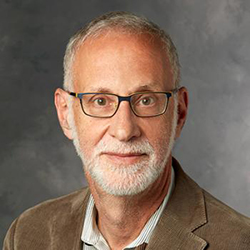LaVerne Gallman Summer Research Workshop
LaVerne Gallman Distinguished Lectureship in Nursing

Title: Precise and/or Equitable: Will our new genomics tools reduce or expand health equity gaps?
Presented by: Mark R. Cullen, MD
Date: Wednesday April, 25, 2018
Time: 3:30 pm – 5:00 pm | Catered Reception to Follow
Location: The Auditorium at the Edgar A. Smith Building (Blanton Museum), 200 E. Martin Luther King Jr. Blvd. Austin, TX 78712
Parking: Parking in Brazos Garage (210 E. Martin Luther King Jr. Blvd. Austin, TX 78712) will be validated free of charge.
Admission: Free Admission – Open to the Public
Contact: If you need any accommodations to participate in this event, please email Kelli Royse or (512) 471-7236 no later than five (5) business days prior to the event.
Event Overview: Join us for the fourth annual LaVerne Gallman Distinguished Lectureship in Nursing and engage with Stanford School of Medicine Mark R. Cullen, MD – Director, Center For Population Health Sciences, Senior Associate Dean for Research, Professor of Medicine, Biomedical Data Science, Epidemiology and Senior Fellow At SIEP to discuss:
- The core reasons why many are concerned that the incorporation of genomics into precision medicine could lead to widened health disparities
- Current impediments to research aimed at applying genomics to the care of historically underserved populations
- Examples of how genomics have been used clinically to assist in prevention and treatment of conditions that disproportionately impact minorities
Doctoral student, Ya-Ching Huang, receives awards and financial support
Doctoral student, Ya-Ching Huang, receives awards and financial support
 Ya-Ching Huang, MSN, RN, and School of Nursing doctoral student, won first place in the Public Health Nursing Section student poster competition at the American Public Health Association annual conference.
Ya-Ching Huang, MSN, RN, and School of Nursing doctoral student, won first place in the Public Health Nursing Section student poster competition at the American Public Health Association annual conference.
Her poster was titled Access to Diabetes Care for Patients at a FQHC System in Central Texas (PDF). Ya-Ching also received the Frances Fowler Wallace Memorial Award for Mental Health Dissertation Research, which is available to eligible doctoral candidates at UT Austin. The award is given annually by the Hogg Foundation. Awardees receive a $1,500 scholarship to help cover research-related expenses. Huang’s research proposal is titled “The Impact of Illness Perception, Diabetes Management Self-Efficacy, and Mental Distress on Type 2 Diabetes Self-Management among Chinese Americans.”
Read Huang’s interview How Cultural Perception Affects Diabetes Management, which was published on the Hogg Foundation for Mental Health website.
Staff Highlight
 Paige Menking is a graduate student at the LBJ School of Public Affairs who joined our team last year to work as a GRA on our Community Health Worker (CHW) Institute. As a health policy student and a certified CHW and CHW Instructor, Paige has proven herself invaluable when it comes to looking at ways to empower this workforce and enhance their presence as part of a holistic health team. She has been selected as our Staff Highlight and shared some of her history and vision for better health care delivery.
Paige Menking is a graduate student at the LBJ School of Public Affairs who joined our team last year to work as a GRA on our Community Health Worker (CHW) Institute. As a health policy student and a certified CHW and CHW Instructor, Paige has proven herself invaluable when it comes to looking at ways to empower this workforce and enhance their presence as part of a holistic health team. She has been selected as our Staff Highlight and shared some of her history and vision for better health care delivery.
Q: What made you decide to go back to school for a master’s degree in Public Affairs?
A: After working for years at non-profits and state agencies, I wanted to get a bird’s eye view of our health care delivery systems to increase my impact. LBJ offers a great combination of thinking big picture but also getting into the weeds. I hope that combination will help me make better decisions at a system level and make positive changes in terms of health care delivery and policy.
Q: What kinds of changes do you feel are the most needed in health care policy and delivery
A: What’s become most clear to me is that there is no silver bullet. Health care is huge, it’s an economic engine and it has so many moving parts. I think the conversation is starting to focus around the intersections of access, quality and patient experience but we can do more to humanize systems of care and CHWs are a big part of that. We need physicians and hospital administrators to center decisions around population health and the social determinants like poverty, housing, trauma, etc. And on a national scale, payment models need to incorporate a realistic view of what affects people’s health and the healthcare system at large. We can’t just think about paying doctors for one specific thing; we need to be thinking about how to have payment models that allow medical providers to address social determinants of health.
Q: What has your experience been like working with TCRSS?
A: Well, besides the healthy snacks that are always available, I feel fortunate to have found a way to continue my work with Community Health Workers while I’m in school. This was the luckiest situation I could have come across, because the CHWs model of providing culturally competent, access to health and social services is something that is really important to me. Dr. Kim and the TCRSS team are focused on innovative and collaborative ways to address health disparities and so my knowledge and skill set just fit right in with the team’s mission and the work they were already doing. I also appreciate the support and guidance from Dr. Kim and the TCRSS team, who value and foster excellent scholarship. They really empower and support me in developing strong skills in the scientific method, including survey development and implementation, delivering presentations and writing for publication.
Q: Where do you see the Community Health Workers fitting in to a new more holistic model of health care delivery?
A: I think CHWs are key to bridging the gap between the health care system and communities who have been traditionally isolated from and mistrustful of that delivery system. There is still no silver bullet, and we need some large structural changes to really ensure health equity, but CHWs are uniquely qualified to address patients’ real issues today. They can help people navigate this really complicated system; they do the hard work of getting people access, and they inject compassion into a sometimes scary situation for a lot of folks.
Q: What kind of policy changes do you think could empower the movement of this work force?
A: Well, we need to figure out how to pay them sustainable and living wages. We need to also figure out how to have career ladders for folks who are doing this work and how to have them grow in their work, so that they don’t have to stay in the same position for 30 years without movement. Figuring out the payment model is the biggest challenge we face now, so when we think of how we are designing a health care system and how Medicaid, Medicare and other insurance plans compensate physicians and hospitals – CHWs and other folks who address population health and social determinants need to be a part of that conversation.
Health Point Mini Grant
 In 2015, TCRSS conducted a wellness survey to gather feedback about which healthy living initiatives would meet the needs and interests of School of Nursing (SON) employees and students. Our goal was to raise awareness about the ways nursing students, faculty and staff perceive their current health, and to identify health-promoting activities and resources the SON community would like to access, it also provided a process to help create an ongoing strategic plan within SON. As part of this initiative, in May 2016, TCRSS applied for and received a HealthPoint mini-grant from the University and received $1,500 to fund new activities to address concerns raised in the survey. More specifically, this mini grant focused on providing outlets to improve mental health and physical activity, in addition to raising awareness about ways to incorporate wellness throughout the work day. The grant paid for yoga mats to be used during group yoga classes that are hosted at SON, and yoga and meditation DVDs that employees can check out for personal use. We received additional funding to paint the main stairwell in bright colors to promote lifestyle physical activity through use of the stairs, instead of the elevator, while in the building.
In 2015, TCRSS conducted a wellness survey to gather feedback about which healthy living initiatives would meet the needs and interests of School of Nursing (SON) employees and students. Our goal was to raise awareness about the ways nursing students, faculty and staff perceive their current health, and to identify health-promoting activities and resources the SON community would like to access, it also provided a process to help create an ongoing strategic plan within SON. As part of this initiative, in May 2016, TCRSS applied for and received a HealthPoint mini-grant from the University and received $1,500 to fund new activities to address concerns raised in the survey. More specifically, this mini grant focused on providing outlets to improve mental health and physical activity, in addition to raising awareness about ways to incorporate wellness throughout the work day. The grant paid for yoga mats to be used during group yoga classes that are hosted at SON, and yoga and meditation DVDs that employees can check out for personal use. We received additional funding to paint the main stairwell in bright colors to promote lifestyle physical activity through use of the stairs, instead of the elevator, while in the building.
“It’s been fun working with the School of Nursing,” said Claire Hahn, Work-Life Balance and Wellness manager. “It’s gratifying working with individuals dedicated to the health of their colleagues and the establishment of a culture of wellness in the workplace.”
Click here learn more about the School of Nursing’s wellness initiatives.
